|
|
|
Sort Order |
|
|
|
Items / Page
|
|
|
|
|
|
|
| Srl | Item |
| 1 |
ID:
159041
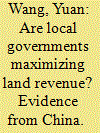

|
|
|
|
|
| Summary/Abstract |
This paper examines how political considerations affect local officials' revenue maximization behaviors in the context of urban land conveyance in China. Particularly, we analyze government intervention based on local officials' choice of two land auction types, namely, “English auction” and “two-stage auction”. The latter presumably serves as a tool of government intervention. We aim to address the research question: “Are local governments maximizing land revenue?” The major findings are threefold. First, for cities with higher housing prices, two-stage auctions are adopted more frequently than English auctions. In addition, land parcels in these “hot” cities adopt two-stage auctions more frequently during sensitive political events, suggesting that local officials respond positively to the real estate regulation policy from central government. Second, when city leaders are more incentivized to promote economic performance, they respond less positively to rises in housing prices. Third, such interventionist behavior results in a significantly depressed land price and housing price. Despite its intention of improving public welfare, this interventionism can susceptibly cause problems of misallocation and corruption.
|
|
|
|
|
|
|
|
|
|
|
|
|
|
|
|
| 2 |
ID:
163340
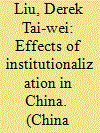

|
|
|
|
|
| Summary/Abstract |
This study takes advantage of a “natural experiment” to show how institutionalization shapes economic outcomes in China. Beijing introduced the mandatory retirement age for provincial leaders in the 1980s, but the rule was not enforced across all provinces until 2000. I use this window to construct a difference-in-differences design and show how the enforcement of mandatory retirement rule leads to better economic outcomes. Provincial leaders eligible for promotion are now motivated to perform better on growth in order to succeed under the performance-based promotion system. But this institution is not perfect, as it results in poorer performances among lame-duck leaders near the retirement age. I also find that leaders with central connection tend to have worse performances. This suggests that when politicians have connection with the center, they hold the key to promotion already, so they do not need to worry about the Chinese-style yardstick competition.
|
|
|
|
|
|
|
|
|
|
|
|
|
|
|
|
| 3 |
ID:
169963


|
|
|
|
|
| Summary/Abstract |
This study tries to determine to what extent the Chinese bureaucracy is merit-based. By triangulating quantitative and qualitative survey data from a sample of Chinese cadres (n=286), the authors aim to answer the research question: ‘What is the behavioral impact of the incentive structure the cadre management system helps to shape, and does the incentive matrix support a meritocratic work environment?’. The findings demonstrate that the promotion of local leading cadres is primarily based on their superiors’ recognition and appreciation. A principal-component analysis reveals that what impresses the superiors includes both patronage and merit factors, although patronage has a slight edge over merit. This study also suggests that good interpersonal skills are essential for both merit- and patronage-oriented career advancement.
|
|
|
|
|
|
|
|
|
|
|
|
|
|
|
|
| 4 |
ID:
133813
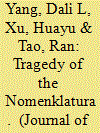

|
|
|
|
|
| Publication |
2014.
|
| Summary/Abstract |
We review James Kung and Shuo Chen's study, published in the American Political Science Review, on the causes of China's Great Leap Famine (1959-1961). Kung and Chen explain the variations in provincial leaders' radicalism on the basis of the career incentives facing the provincial First Secretaries. In this article, we question the validity of their basic assumptions and also uncover serious issues with the Kung and Chen dataset. We conclude that their empirical findings were based on faulty foundations. Our alternative hypothesis instead explains the dynamics of political radicalism during the Great Leap Forward in terms of the provincial leaders' political loyalty to Mao. Our findings point to the significance of political networks in influencing the behavior of elites and, by extension, political and socio-economic outcomes.
|
|
|
|
|
|
|
|
|
|
|
|
|
|
|
|
| 5 |
ID:
131949
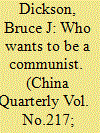

|
|
|
|
|
| Publication |
2014.
|
| Summary/Abstract |
This article analyses trends in the Chinese Communist Party's recruitment strategy and the composition of Party members. Based on original survey data, it analyses the motives for joining the CCP, the consequences on career mobility, and the effects of Party membership on political beliefs and behaviour in contemporary China. These data reveal three key findings. First, for those who aspire to positions in the Party/government bureaucracy or SOEs, Party membership is a necessary, if not sufficient, condition; for those in the non-state sector, it is youth and college education that are the keys to top jobs, and not Party membership. Second, CCP members are more likely to donate time, money, and even blood, for various causes, and to vote in local people's congress elections. This behaviour demonstrates mobilized loyalty: the CCP mobilizes its members to participate in these activities to demonstrate their loyalty to the regime and to serve as examples to the rest of the population. Third, Party members are not more likely to support and trust their state institutions: while they do have higher levels of support for the centre than the rest of population generally, Party membership does not produce increased support for the local state. Nor does economic development: all else being equal, support for central and local party-state institutions is lower in the most developed cities. These findings call into question the Party's recruitment and development policies, as well as the conventional wisdom on the link between economic development and popular support for the status quo.
|
|
|
|
|
|
|
|
|
|
|
|
|
|
|
|
| 6 |
ID:
149940
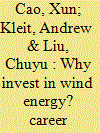

|
|
|
|
|
| Summary/Abstract |
We study wind development at the provincial level in China, modelling installed wind capacities as a function of both economics and politics. We assume that the top provincial officials desire to maximize their chances of promotion under the Chinese cadre evaluation system. We expect that those with the strongest incentives to perform in order to achieve promotion would work harder to comply with the central government’s policy agenda to promote renewable energy. Collecting and testing data on provincial leaders’ characteristics, we find that provinces governed by party secretaries who were approaching the age of 65 are associated with significantly higher level of wind installed capacities. This result supports the political tournaments theory of Chinese politics. We also find that better educated party secretaries are likely to be more supportive of renewable energy, implying that education acts to encourage provincial leaders to support the central government’s policy.
|
|
|
|
|
|
|
|
|
|
|
|
|
|
|
|
|
|
|
|
|